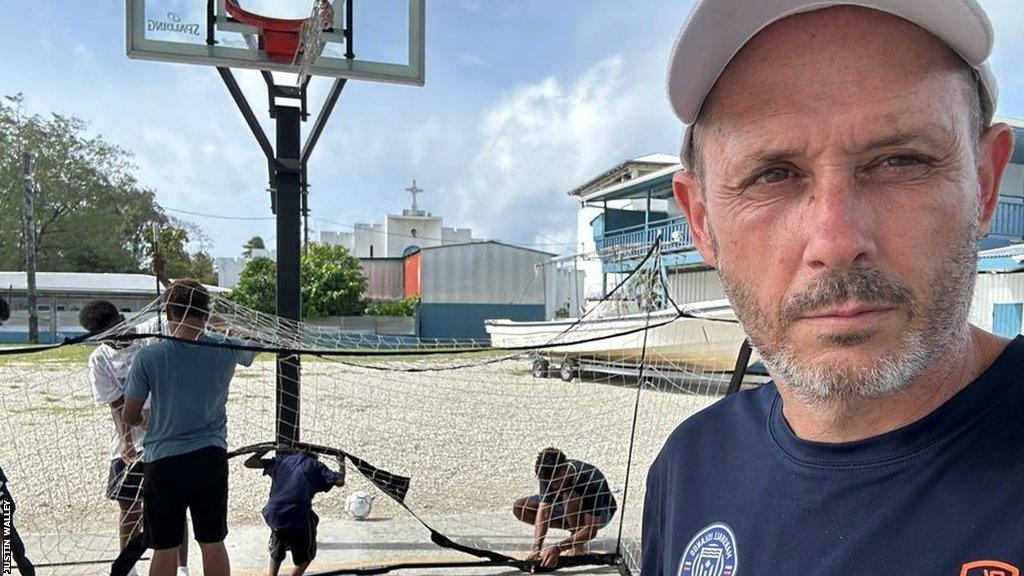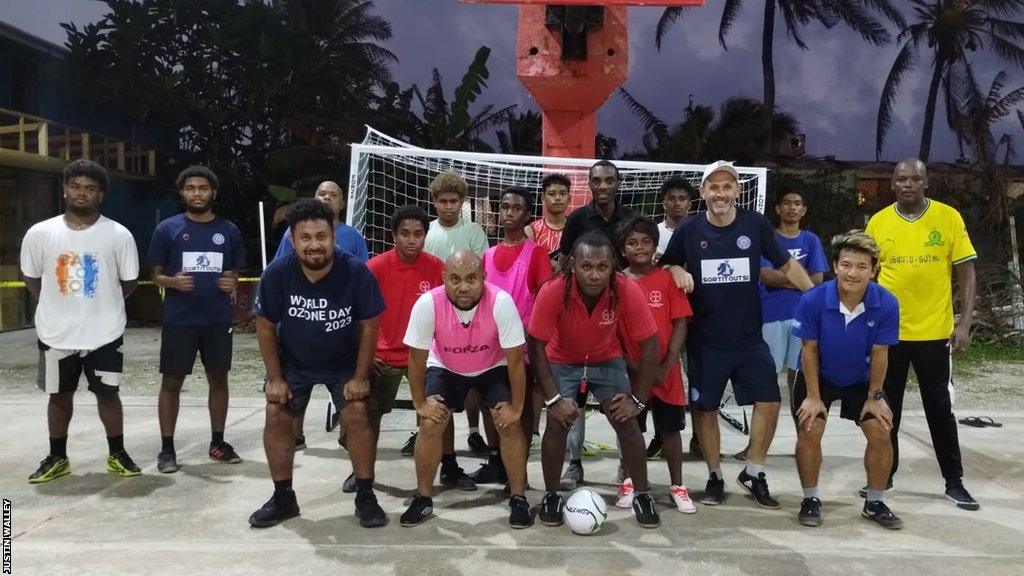Marshall Islands: How pub team know-how is helping 'last country' without national football team
- Published

Justin Walley travelled for 40 hours to reach the Marshall Islands, where he has coached as a volunteer
How do you set up a national football team on a chain of volcanic islands and coral-based atolls in the middle of the Pacific Ocean?
Well, according to a coach from a small Leicestershire town who is helping do exactly that on the Marshall Islands, "it is like starting up a pub team".
Justin Walley is among a group of volunteer coaches trying to bring international football to the last country without it.
Reporting for his first coaching session meant travelling more than 8,000 miles (13,000km) and flying through Los Angles and Hawaii.
But Walley is someone who specialises in exotic football experiences, having worked in Latvia and Matabeleland, a region of Zimbabwe.
"I like to travel to far flung places," he tells BBC Radio Leicester. "I don't know if it is the middle of nowhere or the middle of everywhere."
It is Walley's previous experience, setting up teams from scratch and working at the obscure side of the international stage, that drew him to the Marshall Islands.
He worked in Latvia's capital more than a decade ago, where he helped found Riga United - and went on to coach the women's team for a number of years.
Walley then ventured to Africa, and took Matabeleland to a World Cup - the Confederation of Independent Football Associations (Conifa) tournament, founded to facilitate international football for non-Fifa affiliated regions.
But it was what he learned playing Sunday League football in his home town of Hinckley that has proved most practical on the Marshall Islands, where until recently football (or soccer, as it is better known there) was almost completely absent.
"Many years ago, when I was in my teens, I played in Leicester Sunday District League and Hinckley District League, and all that starts with pretty much starting a pub team," Walley said.
"I mean, it is just getting a group of lads together and finding somewhere to train.
"We are looking at a group of players here who are Sunday District Division Five at the moment. And there are two or three lads that are probably very good, who are much better than that.
"It's about going to the absolute basement and starting it from zero. We are playing on basketball courts because there isn't a single football pitch in the country.
"There is a new track and field stadium which will have a football pitch in the middle of it, which we hope will be our national stadium, but there aren't even five-a-side courts - nothing."

Justin Walley says the Marshall Islands hope to play their first international match in 2024
And when it comes to finding those players, be it in the capital of Majuro or scattered across the chain of islands, the same rules apply.
"I'm on Majuro, the biggest population centre in the Marshall Islands, with 30,000 people, and that's a bit like Hinckley actually," he said.
"So it's a bit like scanning Hinckley for players. A lot of it is word of mouth, we have expats playing.
"At the beginning it's about who wants to play football, some of those people are coming from places that have a football culture and want to play.
"They are here and want to play and they are like: 'Oh my god, there is no football!'"
The desire on the Marshall Islands, however, is to have a sustainable game that will thrive for years to come.
In 2020, the Marshall Islands Soccer Federation (MISF) was founded and fellow Englishman Lloyd Owers was appointed as technical director two years later.
The Marshall Islands has been a sovereign nation since 1986, but the strong links it has with the United States - which occupied the islands following World War Two and used it as a base for nuclear weapons testing - remains evident in its preference for sports.
While basketball and baseball are popular there, the MISF has managed to deliver training sessions at schools.
"Our priority is getting football into schools," said Walley.
"The first thing is getting a load of equipment here and getting it into PE sessions.
"Football is being played, it is on the curriculum and it has already developed from where we were at.
"We started from zero, but everything is looking upwards."